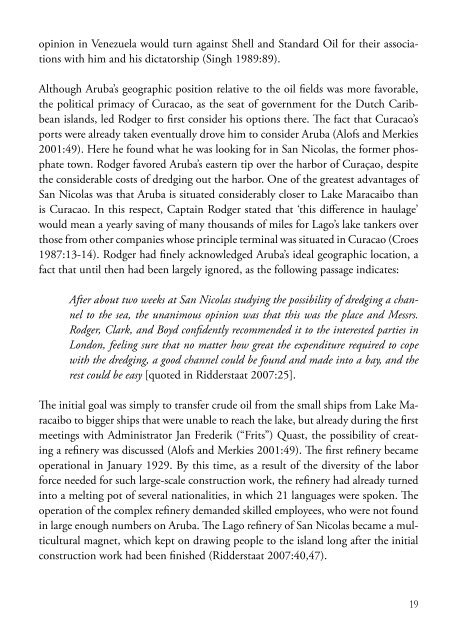Aruba navigating globalizing world.pdf - sociology-of-development
Aruba navigating globalizing world.pdf - sociology-of-development
Aruba navigating globalizing world.pdf - sociology-of-development
You also want an ePaper? Increase the reach of your titles
YUMPU automatically turns print PDFs into web optimized ePapers that Google loves.
opinion in Venezuela would turn against Shell and Standard Oil for their associations<br />
with him and his dictatorship (Singh 1989:89).<br />
Although <strong>Aruba</strong>’s geographic position relative to the oil fields was more favorable,<br />
the political primacy <strong>of</strong> Curacao, as the seat <strong>of</strong> government for the Dutch Caribbean<br />
islands, led Rodger to first consider his options there. The fact that Curacao’s<br />
ports were already taken eventually drove him to consider <strong>Aruba</strong> (Al<strong>of</strong>s and Merkies<br />
2001:49). Here he found what he was looking for in San Nicolas, the former phosphate<br />
town. Rodger favored <strong>Aruba</strong>’s eastern tip over the harbor <strong>of</strong> Curaçao, despite<br />
the considerable costs <strong>of</strong> dredging out the harbor. One <strong>of</strong> the greatest advantages <strong>of</strong><br />
San Nicolas was that <strong>Aruba</strong> is situated considerably closer to Lake Maracaibo than<br />
is Curacao. In this respect, Captain Rodger stated that ‘this difference in haulage’<br />
would mean a yearly saving <strong>of</strong> many thousands <strong>of</strong> miles for Lago’s lake tankers over<br />
those from other companies whose principle terminal was situated in Curacao (Croes<br />
1987:13-14). Rodger had finely acknowledged <strong>Aruba</strong>’s ideal geographic location, a<br />
fact that until then had been largely ignored, as the following passage indicates:<br />
After about two weeks at San Nicolas studying the possibility <strong>of</strong> dredging a channel<br />
to the sea, the unanimous opinion was that this was the place and Messrs.<br />
Rodger, Clark, and Boyd confidently recommended it to the interested parties in<br />
London, feeling sure that no matter how great the expenditure required to cope<br />
with the dredging, a good channel could be found and made into a bay, and the<br />
rest could be easy [quoted in Ridderstaat 2007:25].<br />
The initial goal was simply to transfer crude oil from the small ships from Lake Maracaibo<br />
to bigger ships that were unable to reach the lake, but already during the first<br />
meetings with Administrator Jan Frederik (“Frits”) Quast, the possibility <strong>of</strong> creating<br />
a refinery was discussed (Al<strong>of</strong>s and Merkies 2001:49). The first refinery became<br />
operational in January 1929. By this time, as a result <strong>of</strong> the diversity <strong>of</strong> the labor<br />
force needed for such large-scale construction work, the refinery had already turned<br />
into a melting pot <strong>of</strong> several nationalities, in which 21 languages were spoken. The<br />
operation <strong>of</strong> the complex refinery demanded skilled employees, who were not found<br />
in large enough numbers on <strong>Aruba</strong>. The Lago refinery <strong>of</strong> San Nicolas became a multicultural<br />
magnet, which kept on drawing people to the island long after the initial<br />
construction work had been finished (Ridderstaat 2007:40,47).<br />
19


